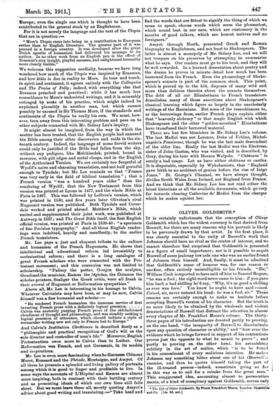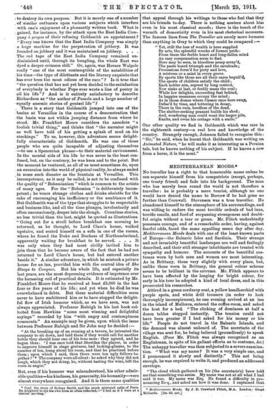OLIVER GOLDSMITH.*
IT is certainly unfortunate that the conception of Oliver Goldsmith which has the widest currency is that derived from Boswell, for there are many reasons why his portrait is likely to be perversely drawn by that artist. In the first place, it was clearly essential to the unity of Boswell's work that Johnson should have no rival as the centre of interest, and we cannot therefore feel surprised that Goldsmith is presented as a figure of small importance; nor is it possible to acquit Boswell of some jealousy towards one who was an earlier friend of Johnson than himself. And, finally, it must be admitted that Goldsmith's sense of humour was, for one reason or anolier, often entirely unintelligible to • his friends. "Sir," William Cook is reported to have said of him to Samuel Rogers, " he was a fool ; the right word never came to him : if you gave him back a bad shilling he'd say, Why, it's as good a shilling as ever was born.' You know he ought to have said coined. Coined, sir, never entered his head: be was a fool, sir." Theie reasons are certainly enough to make us hesitate before accepting Boswell's version of his character. But the truth is no more likely to be obtained by the wholesale and violent denunciations of Boswell that distract the attention in almost every chapter of Mr. Frankfort Moore's volume. , The thirty- three pages of his introduction are devoted partly to proving. on the one hand, "the incapacity of Boswell to discriminate upon any question of character or ability," and " how even the evidence which he brings forward in support of his contentions proves just the opposite to what he meant to prove " ; and partly to proving on the other hand, his astonishing subtlety in the art of malice, which " is to be found in his concealment of every malicious intention. He makes Johnson say something bitter about one of his (Boswell.:,) enemies, and then he quotes himself taking the part of the ill-treated person—indeed, sometimes going so fur in this way as to call for a rebuke from the great •man." This exaggerated idea, amounting almost to persecution mania, of a kind of conspiracy against Goldsmith, serves only '* The Life of Oliver Goldirreith. By Frank ars:wort Moore London slIonstette and Co. [128. 6d. net.] • Conf. the story of Sydney Smith and the much mirrored cafés of Paris.
clerical sainting," Richards. []2s. 6d. net.]
to.deaLroy its own;purpose. But it is merely one of a number , of similar outbursts upon various subjects which interfere with one's enjoyment of a pleasantly written book. What is . gained, for instance, by the attack upon the East India Com- pany a propos of their refusing Goldsmith an appointment ?
"Every one knows that the East India Company was simply a huge machine for the perpetration of jobbery. It was founded on jobbery and it was maintained on jobbery. . . . The red tape of the East India Company remained un- diminished until, through its bungling, the whole East was dyed a deeper crimson still." Or, again, was Horace Walpole really " one of the most contemptible of the notabilities of his time—the type of dilettante and the literary exquisite that has ever been the most odious of the race " ? Is it true that " the question that has not yet been decided to the satisfaction
of everybody is whether Pope ever wrote a line of poetry in all his life "? And is it entirely satisfactory to describe Richardson as "the author of Pamela and a large number of -equally anaemic stories of genteel life " ?
There is a story that Goldsmith jumped into one of the basins at Versailles in the course of a demonstration that the basin was not within jumping distance from where be stood. Mr. Frankfort Moore considers the anecdote " a foolish trivial thing," and thinks that " the narrator might as well have told of his getting a splash of mud on his stockings." To us, however, this adventure seems delight- fully characteristic of Goldsmith. He was one of those people who are quite incapable of adjusting themselves —to use a Spencerian phrase—to their material environment. In the mental side of his life be was never in the least con- fused, hut, on the contrary, he was keen and to the point. But the moment he ventured, as all of us must sometimes do, upon an excursion into the world of physical reality, he always ended in some such disaster as the fountain at Versailles. This incompetence, as it may be called, is not to be confused with
the quality of "Bohemianism " which is common to the artists of many ages. For the " Bohemian " is deliberately incom- petent; he wears strange clothes and drinks absinthe for the
sake of encouraging his inefficiency or the semblance of it. But Goldsmith was of the type that struggles to be respectable and business-like, and all the time plunges, involuntarily and often unconsciously, deeper into the slough. Countless stories, no less trivial than the last, might be quoted as illustrations. " Going out for a stroll before breakfast one morning he returned, as he thought, to Lord Clare's house, walked upstairs, and seated himself on a sofa in one of the rooms, where he found the Duke and Duchess of Northumberland, apparently waiting for breakfast to be served. . . . It was only when they bad most civilly invited him to
join them that be became aware of the fact that he had not returned to Lord Clare's house, but had entered another beside it." A similar adventure, in which he mistook a private house for an inn, provided him with the central idea of She Stoops to Conquer. But his whole life, and especially its last years, are the most depressing evidence of impotence over
the harassing coil of practical details. It is estimated by Mr. Frankfort Moore that he received at least £5,000 in the last four or five years of his life ; and yet when be died he was overwhelmed in debts. But these material difficulties seem never to have embittered him or to have stopped the delight- ful flow of Irish humour which, as we have seen, was not always appreciated. Professor Raleigh in his last book col- lected from Hawkins " some most winning and delightful sayings" recorded by him "with angry and contemptuous comments." An example may be given, upon which the issue between Professor Raleigh and Sir John may be decided :—
" At the breaking up of an evening at a tavern, he intreated the company to sit down, and told them if they would call for another bottle they should hear one of his bons mots: they agreed, and he began thus : I was once told that Sheridan the player, in order to improve himself in stage gestures, had looking-glasses, to the number of ten, hung about his room, and that he practised before them ; upon which I said, then there were ten ugly fellows to- gether ? ' * The company were all silent : he asked why they did not laugh, which they not doing, he, without tasting the wine, left the room in anger."
But, even if his humour was misunderstood, his other admir- able qualities—his kindness, his generosity, his humanity—were almost everywhere recognised. And it is these same qualities
that appeal through his writings to those who feel that they are his friends to-day. There is nothing austere about him even in his most classical moods ; there is the touch of the warmth of domesticity even in his most rhetorical moments. The famous lines from The Traveller are surely more humane than anything in Gray to which they could be compared
" Yet, still the loss of wealth is here supplied By arts, the splendid wrecks of former pride : From these the feeble heart and long-fallen mind An easy compensation seem to find.
Here may be seen, in bloodless pomp array'd, The paste board triumph and the cavalcade; Processions form'd for piety and love, A mistress or a saint in every grove.
By sports like these are all their cares begnird, The sports of children satisfy the child ; Each nobler aim, represt by long control, Now sinks at last, or feebly mans the soul ; While low delights, succeeding fast behind, In happier meanness occupy the mind ; As in those domes where Caesars once bore sway, Defac'd by time, and tottering in decay, There in the ruin, heedless of the dead, The shelter-seeking peasant builds his shed; And, wondering man could want the larger pile, Exalts, and owns his cottage with a smile."
One other quality we find in Goldsmith which was rare in the eighteenth century—a real love and knowledge of the country. Strangely enough, Johnson failed to recognise this : " Sir," he said, when he learnt that Goldsmith was writing on Animated Nature, "he will make it as interesting as a Persian tale, but he knows nothing of his subject. If he knows a cow from a horse, it is the most."











































 Previous page
Previous page